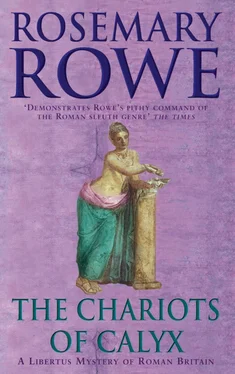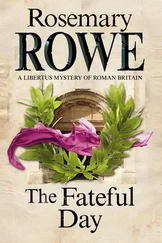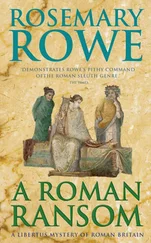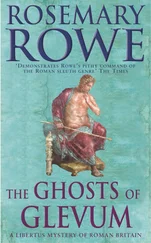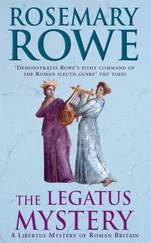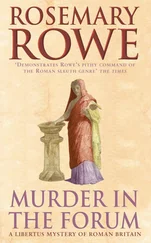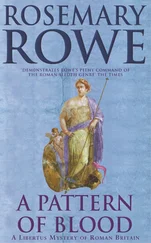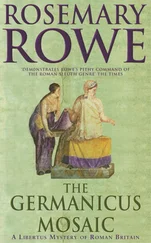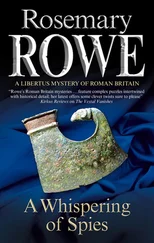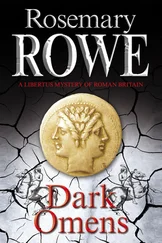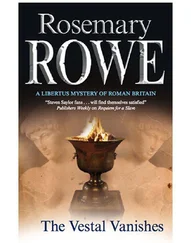Rosemary Rowe - The Chariots of Calyx
Здесь есть возможность читать онлайн «Rosemary Rowe - The Chariots of Calyx» весь текст электронной книги совершенно бесплатно (целиком полную версию без сокращений). В некоторых случаях можно слушать аудио, скачать через торрент в формате fb2 и присутствует краткое содержание. Год выпуска: 2002, ISBN: 2002, Издательство: Headline, Жанр: Исторический детектив, на английском языке. Описание произведения, (предисловие) а так же отзывы посетителей доступны на портале библиотеки ЛибКат.
- Название:The Chariots of Calyx
- Автор:
- Издательство:Headline
- Жанр:
- Год:2002
- ISBN:9781472205087
- Рейтинг книги:5 / 5. Голосов: 1
-
Избранное:Добавить в избранное
- Отзывы:
-
Ваша оценка:
- 100
- 1
- 2
- 3
- 4
- 5
The Chariots of Calyx: краткое содержание, описание и аннотация
Предлагаем к чтению аннотацию, описание, краткое содержание или предисловие (зависит от того, что написал сам автор книги «The Chariots of Calyx»). Если вы не нашли необходимую информацию о книге — напишите в комментариях, мы постараемся отыскать её.
The Chariots of Calyx — читать онлайн бесплатно полную книгу (весь текст) целиком
Ниже представлен текст книги, разбитый по страницам. Система сохранения места последней прочитанной страницы, позволяет с удобством читать онлайн бесплатно книгу «The Chariots of Calyx», без необходимости каждый раз заново искать на чём Вы остановились. Поставьте закладку, и сможете в любой момент перейти на страницу, на которой закончили чтение.
Интервал:
Закладка:
‘Monnius had been married before?’ I interrupted.
It was as stupid a question as it was possible to ask, given what Annia had just been saying to me, but to my surprise she made no unflattering comment. Instead she folded her hands and lips and heaved a great disapproving sigh. ‘Indeed he had. And to a proper sort of woman, too. Neat, clean, respectable and respectful. Not like that creature he divorced her for — full of her own ideas and importance, and interested in nothing but jewellery and clothes. Always prinking and preening in front of her mirrors, and wanting perfumes and fine silks from the markets. I could see from the start what sort of woman she was. It’s not as if she even brought much dowry with her. But would he listen to his mother? No! He was determined to have Fulvia — just because she flashed her eyes and legs at him once at a banquet-’
‘Good morning, citizen.’ A soft, musical, delightfully modulated voice came from somewhere behind me. ‘I regret that I was not informed of your arrival sooner. Please pardon my late appearance — welcome to my house.’
I turned. A woman was standing at one of the inner doorways, attended by two young pages. From her words, her sombre dress, and the poisonous glance which Annia gave her, this was clearly Fulvia, the woman whom Monnius had braved his mother’s wrath to wed. A single glance was enough to tell me why he had thought the prize worth the penalty.
She was in the prime of marriageable womanhood — perhaps sixteen or seventeen — and strikingly beautiful, even in the drab colours and costume of ritual grief. Not virginal in the tall, pale, aquiline Roman fashion, but with the kind of shapely, dimpled, and bold-featured beauty which, offered at the slave market, would make any brothel-keeper in the province start loosening his purse-strings. She moved, too, with the kind of supple grace which somehow suggested a hired dancing girl rather than a respectable Roman matron.
I remembered Annia’s earlier words about flashing her legs at a banquet, and for a moment I almost wondered. But of course there was no question of that. If Fulvia had really ever been an entertainer, Monnius would not have needed to trouble himself with marriage; he would simply have purchased her and that would have been that. This girl was clearly too well born for that. Yet there was something of the dancing girl about her and she had not brought ‘much dowry’ with her.
No wonder Annia disapproved.
I made the due obeisance and stole another look at the widow. She was dressed conventionally enough, in a simple dark-coloured stola, with a soft black drape covering her hair as befitted a woman in mourning, but she still radiated enough physical femininity to make me remember that I was a man — even if an ageing one. The stola was made of rustling stuff — demure, but just sufficiently high cut at the hem to reveal a perfection of ankle, and just low cut enough at the throat to hint at the soft milk-white swell of the breasts below. A woven girdle cord of soft black silk artlessly emphasised the waist. Curls of blonde hair escaped enticingly from under the dark hood, and as she raised her blue-green eyes to meet mine I saw that they had been carefully outlined with kohl, now smudged (not unbecomingly) with weeping.
Beside me Annia Augusta almost hissed with suppressed fury.
But Monnius’ wife was at least a match for his mother. This was, at least until the will was read, her house and she emphasised the point again. She paid not the slightest attention to Annia as she said sweetly, ‘Twice welcome, citizen,’ and extended both hands towards me.
I gasped. Her left arm, until then hidden by the folds of her cape, was heavily bandaged. The stark whiteness of the linen bindings was almost shocking against the supple darkness of her dress — except where, I noticed, there was on the outside of the upper arm a dark red stain that was more shocking still.
‘Lady. .’ I began awkwardly. ‘I am sorry to find you hurt.’ I gestured towards the damaged limb, but she brushed my concern aside with a brave little smile.
‘It is nothing, citizen. Deep enough — but I was fortunate. When I consider. .’ She shook her head. ‘Even now I cannot believe it. If it were not for my faithful slaves. .’ Her teeth, I noticed, were small and uneven, like a child’s. Somehow that flaw in her beauty made her seem more appealing than ever.
‘Your slaves!’ Annia Augusta said with a sniff, interposing herself between us. ‘I only wish they were a little more efficient. We are still awaiting the arrival of a stool, so that this citizen can have his refreshment. I sent one of those useless slaves of yours to fetch one, some little time ago, but there is no sign of it.’ She clasped her stout hands self-righteously across her chest and glared at her daughter-in-law. ‘If I had been permitted to bring my own servants with me, we shouldn’t have had this trouble, I promise you. They knew their duty. But I have no say in anything. No doubt that is the problem — someone has countermanded my orders!’
‘Not I, Annia Augusta, I assure you,’ Fulvia said drily, with a glance at me which suggested that the older woman was imagining things as usual. She turned to the young pages. ‘Go, boys, and see what you can discover about a stool.’
But it seemed that Annia Augusta was right, after all, although not in the way she imagined. Hardly had the slave-boys left the room when they were back again, each carrying a stool, and followed by a thin sallow woman, all in black, with a plain, pinched face and an anxious expression. She bobbed me a greeting but her eyes were only for my older companion.
‘Oh, Annia Augusta, good madam.’ She was still almost bobbing in her anxiety to explain herself, although by her clothes and the handsome necklace round her neck, this lady was a citizen and not the apologetic servant she appeared. ‘This is my doing. Which stool was it that you wanted? The one with the ivory inlay, or the gilded wood? I couldn’t decide. In the end I had them bring you both. .’
I looked from Fulvia to Annia, and from Annia to the newcomer, who was still wringing her hands in apology.
It was Fulvia who spoke. ‘Ah,’ she said. ‘Citizen, I see that you have not met Lydia. My husband’s former wife.’
To say that I goggled would be an understatement. When a Roman divorces his wife he sends her back to her family (if she is not to be punished for unfaithfulness) and generally expects her not to darken his doors again. Yet here was Lydia, only a few hours after Monnius’ death, in his house, already wearing mourning, and agitating the servants about stools. ‘His former wife?’ I found myself saying. ‘How. .?’
Fulvia Honoria gave me a strange wry smile. ‘You see, citizen, Lydia lives in the house — or at least in the annexe, which amounts to very much the same thing. Annia Augusta brought her here three months ago, after her brother, her legal guardian, died. Together with that wretched Filius of hers. Monnius fought against it, naturally, but he had a duty to the child, and Annia claimed she needed a companion.’ She showed those small uneven teeth again.
‘Of course. .’ Annia began, but Fulvia ignored her.
‘An uncomfortable situation, do you not think, citizen? For all of us? I do not think even Lydia was keen, but of course she does everything my mother-in-law tells her, and where else did she have to go? Annia Augusta can be hard to resist when she puts her mind to something. Even Monnius gave way in the end, otherwise she would have made his life unbearable.’
Her voice was composed, and she was still smiling, although she was beginning to look strained, and she moved her hand to her arm as if her wound was troubling her. She was still dignified.
Читать дальшеИнтервал:
Закладка:
Похожие книги на «The Chariots of Calyx»
Представляем Вашему вниманию похожие книги на «The Chariots of Calyx» списком для выбора. Мы отобрали схожую по названию и смыслу литературу в надежде предоставить читателям больше вариантов отыскать новые, интересные, ещё непрочитанные произведения.
Обсуждение, отзывы о книге «The Chariots of Calyx» и просто собственные мнения читателей. Оставьте ваши комментарии, напишите, что Вы думаете о произведении, его смысле или главных героях. Укажите что конкретно понравилось, а что нет, и почему Вы так считаете.
